The Magnificent Ambersons Blu-ray Movie
HomeThe Magnificent Ambersons Blu-ray Movie 
Criterion | 1942 | 88 min | Not rated | Nov 27, 2018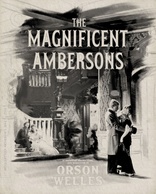
Movie rating
7.9 | / 10 |
Blu-ray rating
| Users | 5.0 | |
| Reviewer | 4.5 | |
| Overall | 4.5 |
Overview
The Magnificent Ambersons (1942)
The spoiled young heir to the decaying Amberson fortune comes between his widowed mother and the man she has always loved.
Starring: Joseph Cotten, Dolores Costello, Anne Baxter, Tim Holt (I), Agnes MooreheadNarrator: Orson Welles
Director: Orson Welles
| Drama | 100% |
| Romance | 36% |
Specifications
Video
Video codec: MPEG-4 AVC
Video resolution: 1080p
Aspect ratio: 1.37:1
Original aspect ratio: 1.37:1
Audio
English: LPCM Mono (48kHz, 24-bit)
Subtitles
English SDH
Discs
Blu-ray Disc
Single disc (1 BD)
Playback
Region A (locked)
Review
Rating summary
| Movie | 3.5 | |
| Video | 4.0 | |
| Audio | 4.5 | |
| Extras | 5.0 | |
| Overall | 4.5 |
The Magnificent Ambersons Blu-ray Movie Review
Reviewed by Dr. Svet Atanasov December 4, 2018Orson Welles' "The Magnificent Ambersons" (1942) arrives on Blu-ray courtesy of Criterion. The supplemental features on the disc include vintage audio commentary by scholar Robert L. Carringer; excerpts from archival audio interviews with Orson Welles; archival episode of The Dick Cavett Show; new video essay by scholar Christopher Husted; and a lot more. The release also arrives with a booklet featuring essays by critics Molly Haskell, Luc Sante, Geoffrey O'Brien, Farran Smith Nehme, and Jonathan Lethem, and more. In English, with optional English SDH subtitles for the main feature. Region-A "locked".
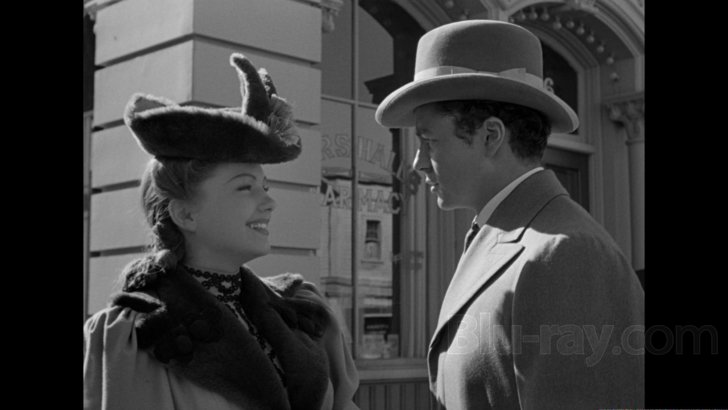
We will never see each other again
It is virtually impossible to write anything of substance about Orson Welles’ The Magnificent Ambersons that has not already been written by someone else. Anyone interested in classic cinema, not just Welles’ legacy, knows exactly why the film suffered such a horrible fate. After Welles landed in Brazil, immersed himself into the good life and then refused to go back home until he was ready to do so, he effectively surrendered The Magnificent Ambersons to RKO. The studio execs in America then did the only thing that made sense to them, which was to manufacture a new version of the ‘dark’ and ‘strange’ film that Welles had left them so that they can recoup as much of their investments as possible. When the film was recut and reedited they did not even care to preserve the trimmed footage, they simply dumped it into the ocean. This is the popular old but true story of how Welles’ film died.
Since then all critical analysis that scholars and casual film fans have produced has targeted a completely different film, not the one that Welles envisioned, and this new film that emerged via RKO was, and still is, a rather odd one.
Here are a couple of examples that highlight just how unWellesian the new film turned out: First, all of the key characters from Booth Tarkington’s novel emerge in it exactly as Welles had recreated them, but now they frequently appear abandoned to make the most out of uneven episodes that tend to produce very uncharacteristic contrasts. Elsewhere Welles’ camera carefully picks all the right angles to produce some astonishingly elegant panoramic visuals, but then suddenly becomes suspiciously indifferent and casually drifts away from them. This abrupt and strange indifference is quite simply impossible to accept as an element of Welles’ grand vision of The Magnificent Ambersons and easily emerges as one of the most obvious forced flaws of the edited version of it that RKO produced. (The big reception early on is the best example where this particular flaw can be observed and understood).
The unlikeability of the young heir, George Minafer (Tim Holt), is perhaps the most widely recognized ‘issue’ with the surviving film, but there is a strategy behind it and it is in fact one of its most Wellesian qualities. Indeed, initially the young man not only sees the world around him through an ever-narrowing prism, but he is utterly incapable of comprehending the most basic feelings and emotions that allow human beings to connect. So Welles sends him on a collision course with his mother, Isabel Amberson (Dolores Costello), and then the girl he becomes attracted to, Lucy Morgan (Anne Baxter), and in the process very carefully uses the drama that ensues to highlight different aspects of the self-destructive nature of elitism. It is this layered structure of the narrative that actually makes the film very interesting. Sadly, in the surviving edited version right at the end the insulated bubble in which George has matured and acquired his cynical beliefs and values is conveniently replaced with a different one in which 'proper' order is promptly restored and elitism reinstalled as an essential part of it.
One crucial element of Welles’ complete vision of The Magnificent Ambersons that was miraculously spared in RKO's cutting room is the heavy sense of nostalgia. It still gently covers the surviving film and forces one to begin contemplating the downfall of the Ambersons in an entirely different context. The intrigues, the revelations, and the various character transformations gradually become part of something far bigger than the fate of the family, which is the end of an era that the invention of the automobile has brought and the beginning of a new one that will soon establish a different socio-economic order. (Two decades after The Magnificent Ambersons the great Luchino Visconti will utilize a prominent sense of nostalgia in an almost identical fashion to recreate a similar transition in his classic drama The Leopard).
The Magnificent Ambersons Blu-ray Movie, Video Quality 
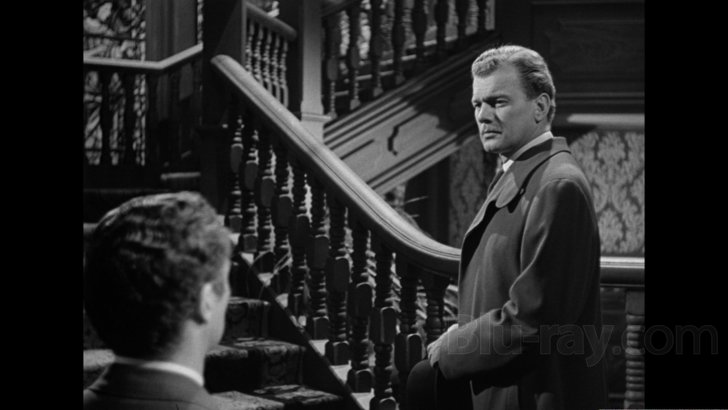
Presented in its original aspect ratio of 1.37:1, encoded with MPEG-4 AVC and granted a 1080p transfer, The Magnificent Ambersons arrives on Blu-ray courtesy of Criterion.
The following text appears inside the booklet that is provided with this Blu-ray release:
"This new digital transfer was created in 4K resolution on a Lasergraphics Director film scanner from a 35mm nitrate fine-grain held by the Museum of Modern Art in New York. Thousands of instances of dirt, debris, scratches, splices, and warps were manually removed using MTI Films' DRS, while Digital Vision's Phoenix was used for jitter, flicker, small dirt, grain, and noise management. The original monaural soundtrack was was remastered from a 35mm print. Clicks, thumps, hiss, hum, and crackle were manually removed using Pro Tools HD and iZotope RX.
Transfer colorist and supervisor: Lee Kline/Criterion Post, New York."
The release is sourced from a brand new 4K restoration of the film that will surely remain its definitive presentation. Considering the nature of the surviving materials it is really quite difficult to imagine that anything else could have been done to make this film look not only healthier, but more balanced and stable. A lot of the darker footage, in particular, which is usually where previous presentations have looked most inconsistent now appears dramatically stronger. Obviously some of the unique cinematographic choices, and specifically the treatment of light and shadow, exacerbate some of the limitations of the existing materials, but on a bigger screen the improvements are quite substantial and very easy to appreciate. So just to be clear, during the darker/indoor footage expect to see some fluctuations in terms of density and mostly 'thicker' visuals (specific examples can be seen in screencaptures #11 and 20). The outdoor footage usually looks very good, and in some cases the age and condition of the surviving elements are practically a non-issue (see screencaptures #1 and 4). Furthermore, the work that has been done to rabalance the visuals as best as possible is very convincing. Naturally, even where traces of fading remain, the visuals still have an excellent organic appearance. Image stability is very good. (Note: This is a Region-A "locked" Blu-ray release. Therefore, you must have a native Region-A or Region-Free player in order to access its content).
The Magnificent Ambersons Blu-ray Movie, Audio Quality 
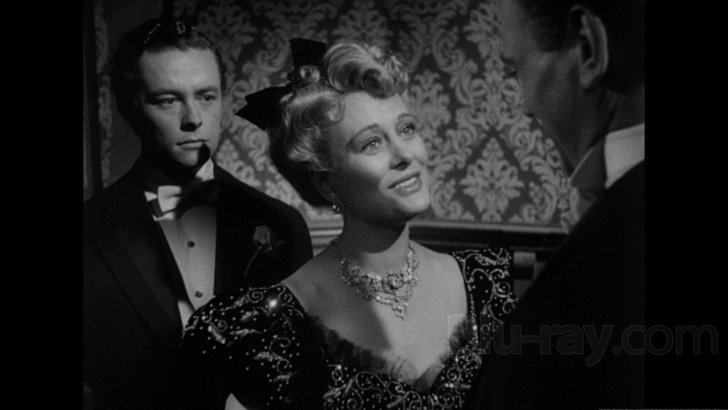
There is only one standard audio track on this Blu-ray release: English: LPCM Mono (48kHz, 24-bit). Optional English SDH subtitles are provided for the main feature.
A lot of work was also done to stabilize and balance the audio as best as possible, so even in areas where the narration/dialog may sound slightly 'thinner' stability remains very good. Fluidity, which tends to be quite vulnerable on many Orson Welles films, is also very pleasing. In the upper register some traces of aging can be detected, but even if you substantially turn up your volume clarity does not appear compromised.
The Magnificent Ambersons Blu-ray Movie, Special Features and Extras 
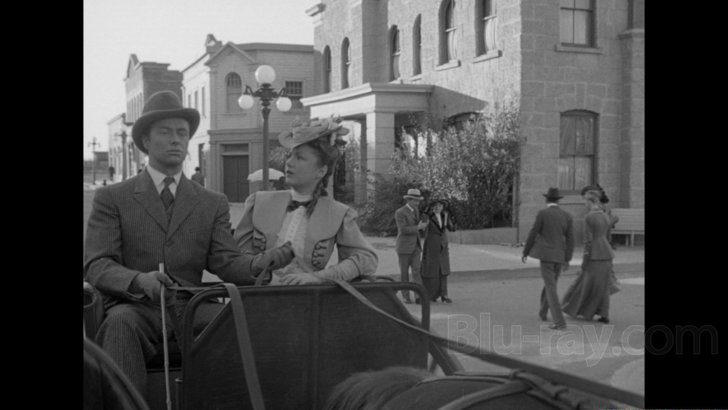
- Trailer - a vintage trailer for The Magnificent Ambersons. In English, not subtitled. (3 min, 1080p).
- Simon Callow - in this new video interview, actor and author Simon Callow discusses Booth Tarkington's novel and the fascinating history of The Magnificent Ambersons, its placement in Orson Welles' body of work and the significant impact that it had on his career and life, some of the film's stylistic qualities, the editing choices that were made by RKO, etc, The interview was conducted exclusively for Criterion in 2018. In English, not subtitled. (26 min, 1080p).
- The Cinematographers - in this new video essay, Orson Welles scholar Francois Thomas examines the constantly evolving stylistic appearance of The Magnificent Ambersons, and why and how it is related to the personal styles of the different cinematographers that worked on the film. The essay was created exclusively for Criterion in 2018. In English, not subtitled. (16 min, 1080p).
- Orson Welles and Dick Cavett - presented here is an archival episode of the The Dick Cavett Show in which Orson Welles discusses a wide range of truths, half-truths, and myths about his life, personality, and work. Also present is Jack Lemmon. There is a particularly funny description of an old theater performance in Boston that ended with an unexpected twist. The episode aired on May 14, 1970. In English, not subtitled. (37 min, 1080i).
- Joseph McBride - in this new video interview, Joseph McBride, author of What Ever Happened to Orson Welles?, discusses RKO's unfortunate decision to butcher The Magnificent Ambersons and Orson Welles' relationship with Hollywood. The interview was conducted exclusively for Criterion in 2018. In English, not subtitled. (29 min, 1080p).
- The Score - in this new video essay, Bernard Herrmann scholar Christopher Husted discusses the recut and reedited versions of The Magnificent Ambersons and the score that Bernard Herrmann composed for it and speculates what Orson Welles' original lost longer version might have looked like. The interview was conducted exclusively for Criterion in 2018. In English, not subtitled. (19 min, 1080p).
- Pampered Youth - Booth Tarkington's novel The Magnificent Ambersons was first adapted for the big screen in by director David Smith in 1925. Presented here is a two-reel segment from the film, which was released in the United Kingdom under the title Two to One in 1931. Silent. Courtesy of Warner Bros. Silent. (29 min, 1080p).
- Peter Bogdanovich Interviews - presented here are audio excerpts from vintage audio interviews with Peter Bogdanovich conducted with Orson Welles in the late 1960s and early '70s. In addition to the production of The Magnificent Ambersons, the comments in the interviews address the evolving cinematography standards, visual composition, the work and style of Jacques Tati (PayTime). In English, not subtitled. (36 min, 1080p).
- Radio Plays - The Magnificent Ambersons was not the first time Orson Welles had adapted the work of Booth Tarkington. On October 16, 1938, CBS Radio's The Mercury Theater on the Air broadcast a radio adaptation by Orson Welles of the novelist's Seventeen. Then, on October 29, 1939, the Mercury Theatre aired a second adaptation, this time of The Magnificent Ambersons. Both are presented here. In English, not subtitled.
1. Seventeen (60 min).
2. The Magnificent Ambersons (56 min).
- Commentary One - this vintage audio commentary features scholar Robert L. Carringer and examines the various changes RKO made on the version of The Magnificent Ambersons left before he headed to Brazil. The commentary, which was recorded in 1985, and appeared on Criterion's old LD release of The Magnificent Ambersons.
- Commentary Two - in this new audio commentary, James Naremore, author of The Magic World of Orson Welles, and Jonathan Rosenbaum, author of Discovering Orson Welles, discuss the conception of The Magnificent Ambersons, its visual style and rhythmic structure, the edited version that RKO created, some popular myths and half-truths about Orson Welles' trip to Brazil and the impact that the editing of his film had on his career and life, etc. The commentary was recorded exclusively for Criterion in 2018.
- Booklet - a booklet featuring essays by critics Molly Haskell, Luc Sante, Geoffrey O'Brien, Farran Smith Nehme, and Jonathan Lethem, and excerpts from an unfinished 1982 memoir by Orson Welles.
The Magnificent Ambersons Blu-ray Movie, Overall Score and Recommendation 
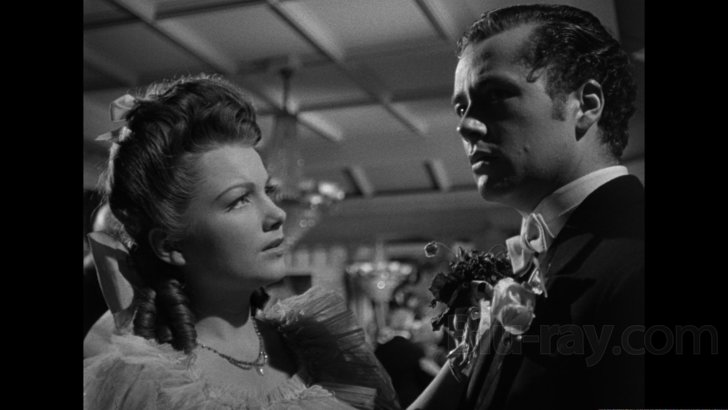
The Magnificent Ambersons is neither the great underappreciated masterpiece nor the terrible film that various people have claimed it is over the years. More importantly, in its current form it is simply not Orson Welles' film. Yes, Welles' touch is still very easy to recognize and there are long segments where a lot comes together very nicely, quite possibly exactly as he had intended, but the 'edited' version that RKO produced has obvious issues and clearly delivers a foreign identity to the original material. It is sad that we will almost certainly never view the film that Welles crafted, but this should not be our excuse to misjudge his intentions and vision for it. The film that survives is still very interesting and in many ways quite revealing of what Welles was trying to accomplish, and this is probably the only proper context in which it should be deconstructed and evaluated. Criterion's new Blu-ray release of The Magnificent Ambersons is sourced from a very strong 4K restoration and features an excellent selection of bonus features. HIGHLY RECOMMENDED.
Similar titles
Similar titles you might also like

Tess
1979

Letter from an Unknown Woman
1948

The Age of Innocence
1993

Othello
The Tragedy of Othello: The Moor of Venice
1951

Bright Star
2009

The Piano
1993

Great Expectations
1946

The Gold Rush
1925

Waves
2019

The Damned
La caduta degli dei
1969

The Earrings of Madame de...
Madame de...
1953

Brief Encounter
1945

Sunrise
Sunrise: A Song of Two Humans
1927

Her Smell
2018

The Red Shoes 4K
1948

Summer Interlude
Sommarlek
1951

The Life and Death of Colonel Blimp
1943

Written on the Wind
1956

Make Way for Tomorrow
1937

The Heiress
1949